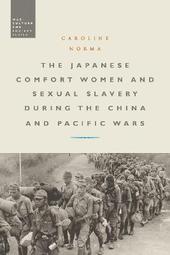
|
The Japanese Comfort Women and Sexual Slavery during the China and Pacific Wars
Hardback
Main Details
| Title |
The Japanese Comfort Women and Sexual Slavery during the China and Pacific Wars
|
| Authors and Contributors |
By (author) Dr Caroline Norma
|
| Series | War, Culture and Society |
|---|
| Physical Properties |
| Format:Hardback | | Pages:264 | | Dimensions(mm): Height 234,Width 156 |
|
| Category/Genre | Asian and Middle Eastern history
Second world war |
|---|
| ISBN/Barcode |
9781472512475
|
| Classifications | Dewey:940.54050820952 |
|---|
| Audience | | General | | Professional & Vocational | | Tertiary Education (US: College) | |
|---|
|
Publishing Details |
| Publisher |
Bloomsbury Publishing PLC
|
| Imprint |
Bloomsbury Academic
|
| Publication Date |
17 December 2015 |
| Publication Country |
United Kingdom
|
Description
The Japanese military was responsible for the sexual enslavement of thousands of women and girls in Asia and the Pacific during the China and Pacific wars under the guise of providing 'comfort' for battle-weary troops. Campaigns for justice and reparations for 'comfort women' since the early 1990s have highlighted the magnitude of the human rights crimes committed against Korean, Chinese and other Asian women by Japanese soldiers after they invaded the Chinese mainland in 1937. These campaigns, however, say little about the origins of the system or its initial victims. The Japanese Comfort Women and Sexual Slavery during the China and Pacific Wars explores the origins of the Japanese military's system of sexual slavery and illustrates how Japanese women were its initial victims.
Author Biography
Caroline Norma is Lecturer in the School of Global, Urban and Social Studies at RMIT University in Melbourne, Australia.
ReviewsMaking abundant use of survivor testimony - Japanese victims included - Caroline Norma makes clear the need to continue to learn from the violence endemic to Japan's history of state-sponsored sexual slavery many decades ago. The current day incidences of sexual slavery as a weapon of war makes this history more urgent than ever. * Alexis Dudden, University of Connecticut, USA *
|